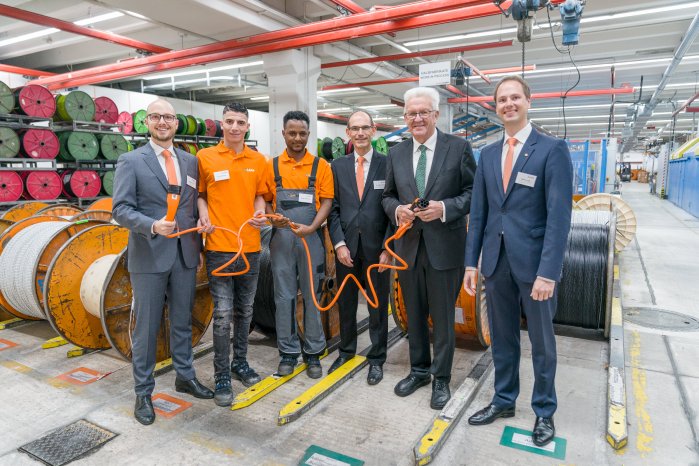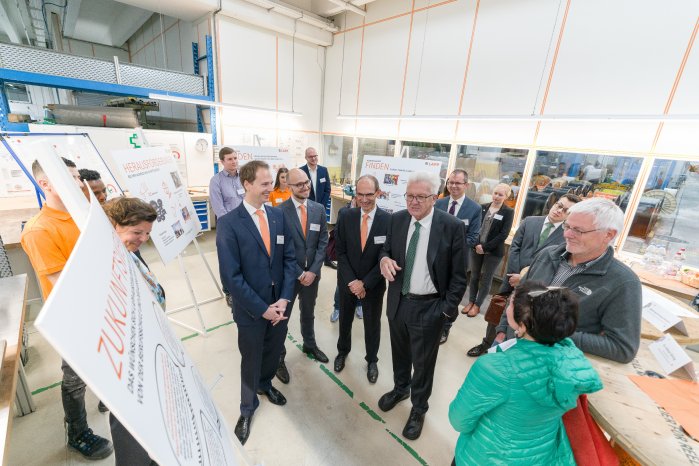Previously, Matthias Lapp, CEO of U.I. Lapp GmbH, and Dr Hilmar Döring, Member of the Board for Human Resources at LAPP Holding AG, gave the Minister-President detailed insights into apprenticeships at the company in the LAPP cable plant and training centre. They were accompanied by a number of LAPP apprentices, including several refugees and former apprentices. This focused on how LAPP attracts apprentices and how they are retained in the family business both during and after their training. The event also detailed the specific challenges that the company faces in training and how the apprenticeship of the future should look.
“As a family business, we take our social responsibility very seriously. We want to give young people good opportunities for the future. We mainly train people for our own needs, as well-trained and qualified employees help ensure both our capabilities and the success of our company in the long term”, explained Matthias Lapp. Dr Hilmar Döring, Member of the Board for Human Resources emphasised: “A good apprenticeship is just the first step. Our aim is to make our company a learning organisation, in which lifelong learning among employees and continuous systematic development of the organisation are inextricably linked”.
At present, 63 young men and women are apprentices at LAPP’s Stuttgart site. Over 90 per cent of apprentices were retained by the business in recent years. This year, the world market leader for integrated cable and connection solutions is offering apprenticeships in ten different areas. Youngsters can learn both commercial and technical careers such as industrial management, warehouse logistics, machine operation and electronics. LAPP also offers dual-study programmes such as business and service management with logistics and supply chain management, or electronic industrial engineering. Among the apprentices are four refugees from Eritrea and Syria, who, after completing their 12-month entry qualification, have started apprenticeships in machine operation and IT systems integration.
Alexander Lapp, responsible for digitalisation throughout the entire LAPP Group, believes that digital transformation should play a greater role in training: “Digitalisation needs to be a central element of professional training, in order to make young people fit for the job market both today and in the future. We as a company are already doing a lot, but we need standards. Government needs to step up to the plate here”.
LAPP goes to great lengths to attract apprentices. It has set itself the goal of having the best staff in the sector, a big challenge in such a competitive market as Stuttgart. The company appears at apprenticeship fairs and supports a range of careers events such as “Girls’ Day”, the “STEM Dialogue Days” and “Boss for a Day”. Placements for school students are also available. LAPP has entered education partnerships to support these initiatives, such as with the Anne-Frank-Gemeinschaftsschule and Realschule Stuttgart, as well as the Hegel-Gymnasium Stuttgart. Education cooperation agreements are also in place with four other Stuttgart schools. A total of 1,117 young people applied for apprenticeships at LAPP in the current training year.
The apprenticeship at LAPP begins with an introductory training week, in which the new apprentices get their first insight into the company’s structures, processes and characteristics. Following this, a joint team building session with all apprentice year groups takes place at the State Academy for Youth Education in the nearby town of Weil der Stadt.
Another important element of training at LAPP are the regular training weeks and team training sessions, as well as numerous events and projects that specifically involve the apprentices. These include the organisation of the annual company birthday party, careers fairs for local school leavers, or science and technology events for inquisitive young children. The apprentices are also an important part of LAPP’s trade fair team at the Hannover Messe. Other projects see the youngsters take on social responsibility. In one of these, they work for two weeks in a social institution of their choice as part of a project.
As a globally active company, LAPP also allows its apprentices and students to spend time working abroad. For four to twelve weeks, they have the choice of either working in different departments in one of LAPP’s international subsidiaries or taking part in the EU’s ERASMUS+ programme, spending time in a different company and taking a language course. This offer was taken up by 15 apprentices in 2017/18.
“We make our apprentices part of the LAPP family from day one and give them responsibility. This is a big motivating factor, as they see that they can achieve great things at LAPP. Our apprentices are therefore some of our most important employees and the basis of our success”, explained Matthias Lapp.



